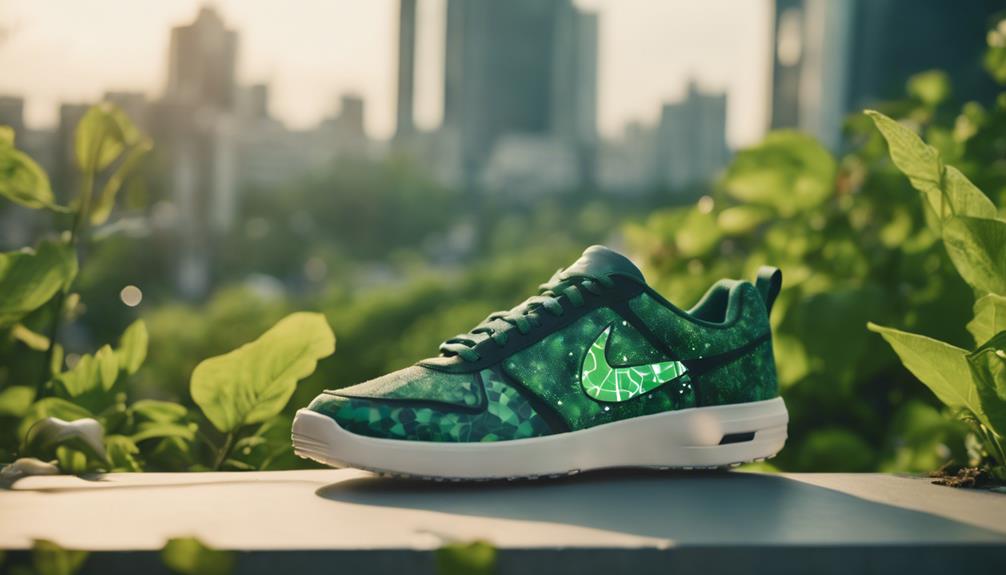Nike’s sustainability image is a bit of a mixed bag, and the realities hiding below the surface might surprise you. Despite their promotion of recycling and the use of sustainable materials, reports have emerged detailing ongoing labor problems and environmental issues. Allegations of sweatshop conditions and forced labor further complicate their story. Moreover, their transparency leaves much to be desired, casting doubt on the true impact of their eco-friendly claims. Nike generates significant textile waste and faces criticism for greenwashing. While they do have sustainability initiatives, the lack of accountability can be concerning. Delve deeper to uncover the complexities surrounding Nike’s sustainability efforts and how they may affect you.
Key Takeaways
- Nike's sustainability rating is low at 23/100, indicating significant challenges in ethical practices and environmental impact.
- Despite initiatives like the Move to Zero, Nike still relies heavily on non-biodegradable materials.
- Allegations of greenwashing have emerged, questioning the authenticity of Nike's sustainability claims and recycled materials usage.
- Reports of sweatshop conditions and low wages continue to undermine Nike's commitment to ethical labor practices.
Nike's Brand Overview
Nike, established in 1964, has become a powerhouse in the sportswear industry, boasting a brand value of $51.2 billion and 95% awareness among U.S. consumers.
As a leading sportswear brand, Nike excels particularly in footwear, with 62% of its sales stemming from this category. The company's innovative designs, like the iconic Waffle Trainers, not only enhance athletic performance but also set trends in the apparel market, capturing 29% of its sales.
However, Nike faces challenges in comparison to fast fashion brands like ASOS, which offer a broader selection of products. While Nike's average shoe price hovers around $110, positioning it in the mid to high-price range, consumers are increasingly considering the environmental impact of their purchases.
This awareness has sparked discussions around Nike's use of sustainable materials and its efforts to reduce its carbon footprint. Although the brand is renowned for its quality, the scrutiny over its environmental practices raises questions about its long-term sustainability.
As Nike continues to innovate, balancing profitability with ethical labor practices and eco-friendly initiatives will be essential to retaining its status as a leader in the sportswear market.
Ethical Labor Practices
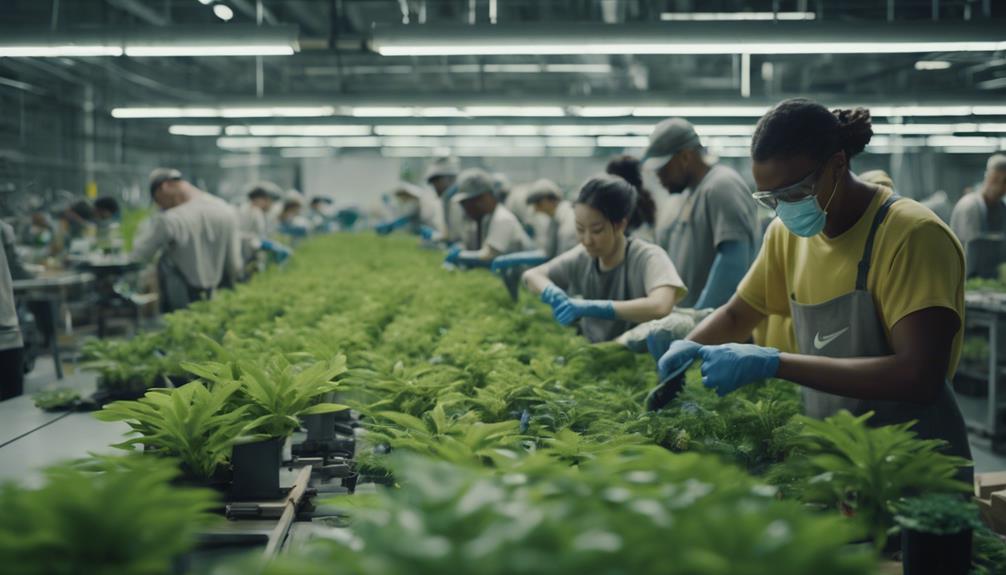
You might be surprised to learn that Nike's history is riddled with allegations of unethical labor practices, dating back to the 1970s.
While the company has made some recent improvements, ongoing issues like unpaid wages and forced labor still raise serious concerns about worker rights.
It's crucial to examine how these factors impact Nike's claim to be a leader in sustainable fashion.
Historical Labor Violations
Longstanding accusations of labor violations have dogged the brand, highlighting issues like sweatshop conditions, low wages, and child labor.
Since the 1980s and 1990s, Nike faced criticism for its treatment of garment workers, who reported inadequate working conditions and unpaid wages. Despite claims of ethical reforms, many still question the authenticity of these changes. The severance of ties with the Worker Rights Consortium in 2017 limited independent monitoring of labor practices, raising serious concerns about transparency in Nike's factories.
Moreover, recent allegations reveal forced labor practices involving Uighurs in Xinjiang, China, further complicating Nike's ethical labor reputation. This situation underscores the ongoing labor violations that challenge the brand's image.
Workers' rights remain a significant issue, as many employees continue to demand fair treatment and just compensation. While Nike has made some strides in improving monitoring and addressing wage concerns, the lingering effects of past practices cast a shadow over their efforts.
As you evaluate Nike's commitment to sustainability, consider how these historical labor violations impact their overall ethical standing in the fashion industry.
Recent Ethical Improvements
Recent efforts have seen the company raise wages for 7,000 workers, primarily women, aiming to enhance labor conditions and promote fair compensation in its factories. This move reflects Nike's commitment to recent ethical improvements, especially concerning women's representation and diversity and inclusion. Significantly, women now hold 43% of VP positions and above, demonstrating progress in leadership roles.
In 1999, Nike established the Fair Labor Association to monitor its factories and guarantee compliance with ethical labor practices. While this initiative has been essential, challenges remain, particularly regarding child labor-free products. Despite these improvements, Nike still faces ongoing scrutiny, with 20 workers unions filing complaints against the company for rights violations.
Additionally, a 2023 class action lawsuit highlights allegations of misleading sustainability claims and ongoing labor violations, including reports of forced labor. These issues underscore the significance of continued focus on ethical labor practices.
While Nike has made strides in enhancing labor conditions and addressing complaints against the company, the journey toward complete sustainability and ethical compliance is far from over. Your awareness and advocacy can help push for further improvements in the industry.
Ongoing Worker Rights Issues
Ongoing reports of sweatshop conditions and inadequate labor practices continue to challenge Nike's claims of ethical compliance in its factories. Despite achieving Fair Labor Association certification, you might be surprised to learn that serious concerns about workers' rights remain. In March 2023, garment workers across multiple countries protested for unpaid wages, exposing violations of their rights and the lack of favorable working conditions.
Nike's withdrawal from the Worker Rights Consortium in 2017 has limited independent monitoring of its supply chain, raising questions about its commitment to ethical labor practices. Transparency is vital, yet many still doubt the effectiveness of Nike's monitoring efforts. Reports of forced labor involving Uighurs in Xinjiang, China, have intensified scrutiny of the company's labor rights commitments, casting a shadow over its sustainable fashion image.
While Nike touts its sustainable initiatives, the reality of labor practices in its factories suggests a significant gap between claims and practices. As a consumer, it's important to reflect on these ongoing worker rights issues and hold brands accountable for their impact on the lives of workers across the globe.
Sustainability Initiatives
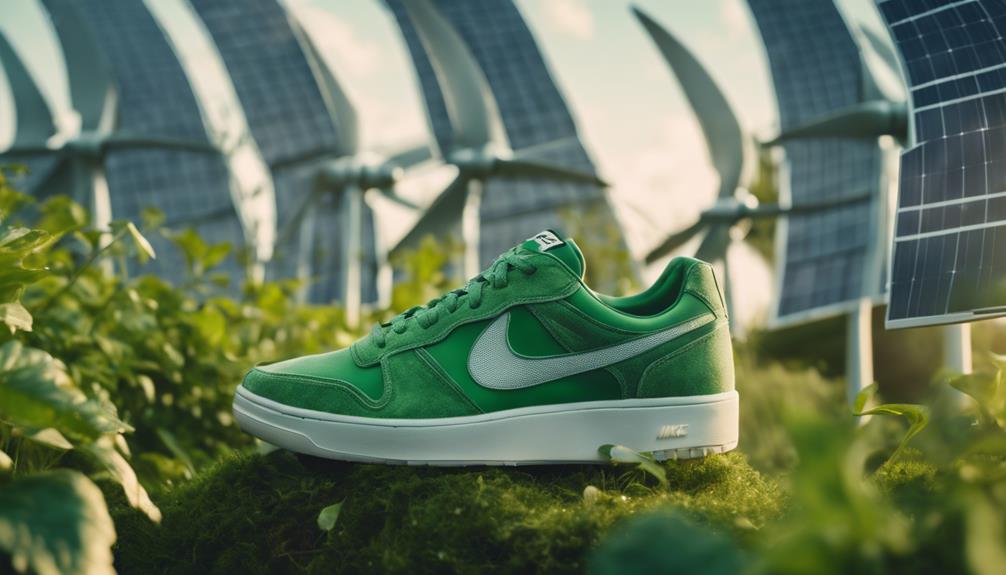
Nike's ambitious sustainability initiatives focus on achieving zero carbon emissions and waste by leveraging renewable energy and innovative materials. Through its Move to Zero initiative, you'll find efforts to eliminate plastic waste and reduce greenhouse gas emissions considerably. The company sources 100% of its cotton from ethical and sustainable sources, including certified organic and recycled materials. Impressively, 78% of Nike's products incorporate recycled materials, showcasing their commitment to sustainability.
Nike has also introduced innovative products like Flyleather, made from 50% recycled leather fibers, and Space Hippie shoes, crafted from 50% waste materials. This not only reduces carbon emissions but also sets a precedent for sustainable fashion. Additionally, the Move to Zero initiative includes a free shoe recycling program and sustainable packaging solutions, which have decreased waste by 51% per online order.
However, despite these positive strides, Nike faces scrutiny over allegations of greenwashing. A May 2023 class action lawsuit claimed their sustainability claims might be misleading. This tension raises questions about the authenticity of their efforts and challenges the perception of Nike as a truly sustainable brand.
Transparency and Accountability
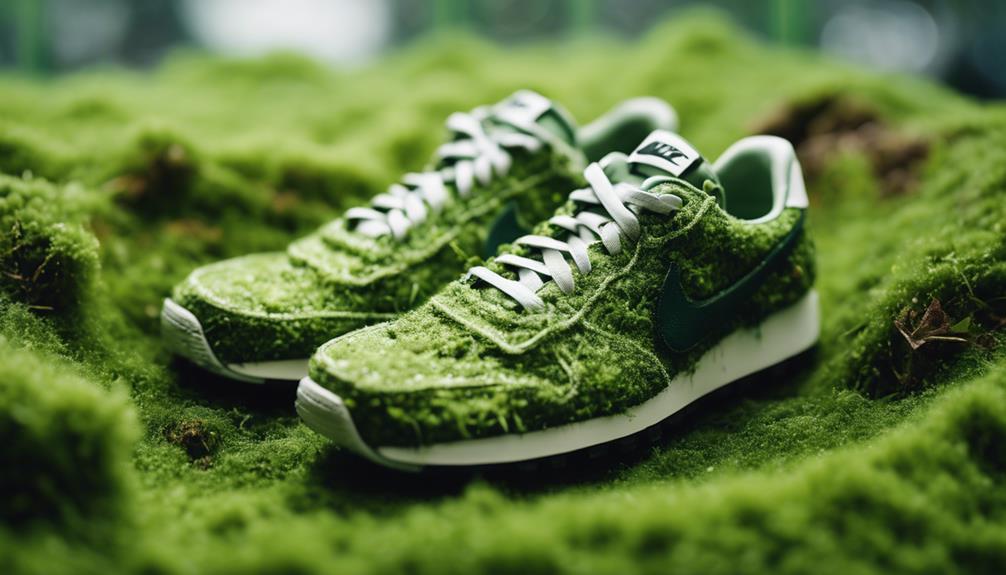
When you look at Nike's sustainability claims, you might notice some inconsistencies that raise questions about their transparency.
Issues surrounding supply chain practices and labor conditions make you wonder how accountable the company truly is.
It's essential to examine whether Nike's actions align with their promises or if they're simply spinning a narrative.
Sustainability Claims Scrutinized
Sustainability claims in the fashion industry, especially those from major brands like Nike, are increasingly under the microscope as consumers demand greater transparency and accountability.
Nike's sustainability initiatives have faced significant scrutiny, particularly after a May 2023 class action lawsuit alleged misleading eco-friendly marketing. Critics argue that while Nike promotes its use of recycled materials, a large portion of its products still contains non-biodegradable and harmful materials, raising concerns about potential greenwashing.
Despite Nike's pledge to reduce its carbon footprint by 30% by 2030, doubts about the authenticity and impact of its sustainability efforts persist. The Fashion Transparency Index rated Nike between 51-60% for 2021-2022, indicating only moderate transparency regarding its sustainability practices.
In addition, Nike's withdrawal from the Worker Rights Consortium in 2017 has limited independent oversight of its labor practices, intensifying concerns about accountability.
In this climate of heightened scrutiny, Nike's sustainability claims face a critical test. Consumers are becoming more aware, demanding not just claims but verifiable actions that genuinely reflect the brand's commitment to sustainability and responsible practices.
Supply Chain Transparency Issues
Transparency in supply chains is critical for holding brands accountable for their labor practices. Yet, Nike's withdrawal from the Worker Rights Consortium has raised serious concerns. This move limited independent monitoring, leaving many questioning the ethical labor conditions within Nike's supply chains.
Despite having a code of conduct, Nike's failure to disclose garment worker wages and living standards, particularly in countries like Indonesia, is troubling. The Fashion Transparency Index shows Nike's scores ranging from 51-60% in recent years, indicating only moderate transparency. This lack of clarity highlights significant gaps in accountability regarding labor practices.
Reports from human rights organizations reveal ongoing issues, including allegations of sweatshop conditions and forced labor in Nike's production facilities. Moreover, a class action lawsuit filed in May 2023 accused Nike of misleading consumers about its sustainability claims, complicating the brand's image further.
As you consider Nike's position in sustainable fashion, it's crucial to scrutinize these supply chain transparency issues. Without clear accountability, the brand's sustainability claims ring hollow and raise critical questions about the true cost of its products on workers' lives.
Alternative Brands

Exploring alternative brands can uncover exciting options that prioritize environmental responsibility while still delivering style and performance. These brands not only offer sustainable activewear but also greatly reduce your environmental footprint compared to fast fashion.
Here are four brands to evaluate:
- CARIUMA: This Brazilian sneaker brand uses organic materials, ensuring comfort while minimizing environmental impact.
- Adidas by Stella McCartney: Collaborating for ethical fashion, this line features footwear made from recycled Parley Ocean Plastic®, tackling ocean waste effectively.
- dk active: An Australian brand rated Great, they utilize renewable energy and textile offcuts to create 100% vegan products, approved by PETA.
- Tripulse: This Swedish activewear brand focuses on high performance and sustainability, emphasizing that fitness is essential to a healthy life.
You can also explore Nike's pre-owned options, which allow you to shop sustainably for second-hand products.
By choosing these alternative brands, you embrace a circular economy mindset, helping to reduce waste and combat the impact of fast fashion.
Make the switch today and support brands that align with your values!
Overall Assessment
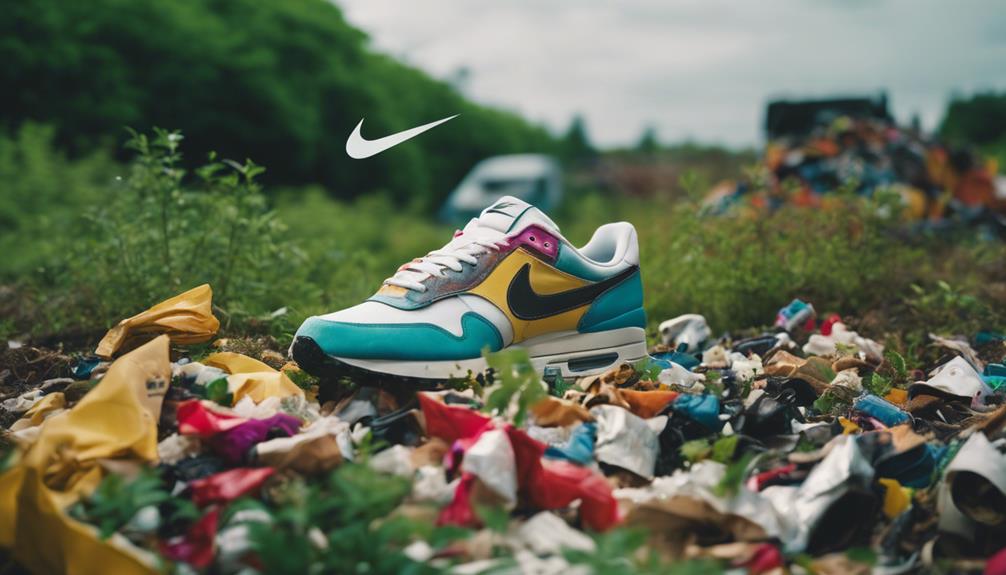
While alternative brands offer promising sustainable options, Nike's overall sustainability assessment reveals significant challenges that need to be addressed. With a low rating of 23/100, it's clear that Nike has a long way to go. The company generates over 1.92 million tonnes of textile waste annually, exacerbating the fast fashion crisis, even as it promotes initiatives like the Reuse-a-Shoe program.
Nike has pledged to reduce its carbon footprint by 30% by 2030, but its heavy reliance on non-biodegradable materials like polyester raises concerns about the longevity of its sustainability efforts. In 2023, allegations of greenwashing emerged, with a class action lawsuit claiming that Nike's sustainability claims about recycled materials were misleading.
Moreover, ethical concerns surrounding labor practices complicate Nike's image. Reports of sweatshop conditions and insufficient living wages for workers reveal significant gaps in their commitment to ethical fashion.
Until these challenges are effectively addressed, Nike's sustainability narrative remains clouded by skepticism, leaving you to question whether it can truly be considered a leader in sustainable fashion.
Frequently Asked Questions
Is Nike Actually Environmentally Friendly?
You might think Nike's efforts make it environmentally friendly, but with only 78% of products using recycled materials and significant waste production, their sustainability claims could be misleading. It's essential to dig deeper into their practices.
How Does Nike Support Sustainable Fashion?
Imagine stepping lightly on the planet; Nike supports sustainable fashion by committing to zero carbon emissions, sourcing organic materials, and recycling through initiatives like Move to Zero. You're wearing the future when you choose Nike.
Is Nike Ethical or Unethical?
You'll find that Nike's ethical standing raises serious concerns. Despite marketing claims, reports of labor violations, low wages, and lack of transparency suggest its practices remain questionable, leaving many to question the brand's true commitment to ethics.
Is Nike a Truly Sustainable Company or Is It Greenwashing?
You might think Nike's a green superhero, saving the planet with eco-friendly moves. But with serious allegations of greenwashing and labor violations, their sustainability claims could be more like a costume hiding the truth.
What Makes Nike a Sustainable Fashion Brand, Considering Their Environmental Impact?
Nike is taking steps to become a sustainable fashion brand by reducing their environmental impact. They are implementing innovative technologies to create more eco-friendly products and are committed to using sustainable materials. This shift towards sustainability is a positive move for the fashion industry. is h&m sustainable fashion??
Conclusion
In the quest for conscious consumerism, Nike's journey toward sustainability isn't as straightforward as it seems.
While they've made strides in ethical practices and eco-friendly initiatives, there's still a slippery slope of scrutiny surrounding their transparency.
So, whether you choose to champion Nike or explore alternative brands, remember: the path to planet-friendly fashion is paved with purpose and progress.
Stay savvy, seek solutions, and support sustainable styles that truly shine!
